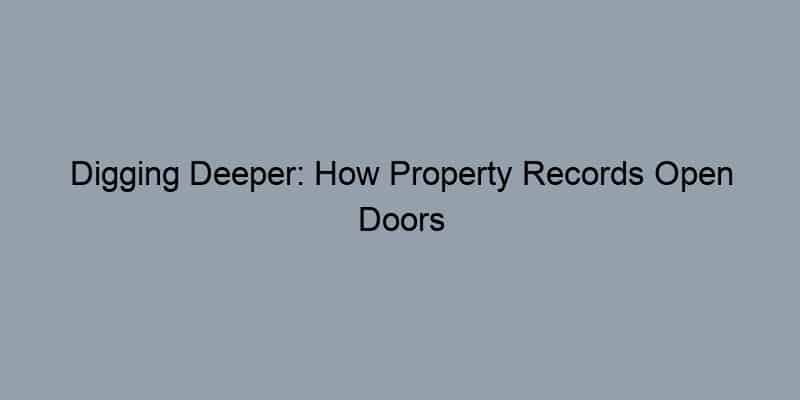Buying or selling a home can feel like navigating a maze of information. The process can be daunting, but one crucial tool can help you find your way: property records. Understanding these records can make a world of difference for buyers, sellers, and real estate professionals. Let’s explore what property records are, why they’re essential, and how they can empower your real estate decisions.
What Are Property Records?
Property records are official documents that provide detailed information about a specific property. These records can include a variety of information, such as ownership history, sales prices, tax assessments, and any liens or mortgages on the property.
Why Are Property Records Important?
Property records serve as a reliable source of information for anyone involved in real estate transactions, including:
- Home Buyers: Understanding a property’s history can help you make informed decisions.
- Home Sellers: To accurately price and present their home, sellers need to know its past.
- Realtors and Real Estate Agents: They rely on these records to guide clients and offer professional advice.
- Real Estate Agencies: These organizations use property records for market analysis and strategy planning.
Having access to accurate property records can save time, money, and stress for everyone involved.
Key Information
- What They Are: Official documents detailing a home’s history and status.
- Importance: Used by buyers, sellers, and realtors to navigate real estate decisions.
- Types of Information: Ownership records, property values, sales history, tax info, and liens.
- Utilization: Helps establish fair market value, understand the property’s past, and identify any potential issues.
Why You Need a Comprehensive Property Record
When you consider buying or selling a home, a comprehensive property record is your best friend. Here’s why:
1. Finding Home Values
Knowing a home’s value is crucial in negotiations. Property records often have past sales prices, which give you a good indication of its current worth. For instance, if you’re considering buying a house listed at $300,000 but see that it was last sold for $250,000 a year ago, this could guide your negotiations.
2. Sales History
The sales history of a property provides context. If a home has changed hands multiple times in a short period, it might raise a red flag. Understanding why a property didn’t sell for long can help you avoid potentially making a poor investment.
3. Tax Records
Property taxes can significantly affect your monthly budget. A tax record shows how much the current owner pays, which can help you estimate your future expenses. For example, if the current owner pays substantially more than nearby homes with similar square footage, this could indicate an overvaluation.
4. Mortgages and Liens
The presence of unpaid mortgages or liens could put you at risk as a buyer. A property record will show you if there are any outstanding claims against the property. Knowing this information means you can negotiate accordingly or even decide to walk away if red flags pop up.
5. Homeowner Information
Understanding who currently owns a property and if they are a reputable seller can provide peace of mind. If the seller is an individual or an established property company, this can influence your comfort level with making an offer.
Examples of How Property Records Help
-
Home Buyers: Let’s say you’re interested in a charming bungalow. You access the property record and discover it was sold twice in five years. This raises concerns, and you decide to investigate further, potentially avoiding a bad investment.
-
Home Sellers: Imagine you inherited a family home. Before listing, you pull its property records and find that similar homes in the area sold for much less than you expected. You may need to adjust your asking price for a quicker sale.
-
Realtors: A realtor can use property records to show a buyer how much homes have appreciated over the years in a specific neighborhood, helping them understand market trends.
-
Real Estate Agencies: By pulling data on property records, agencies can target their marketing strategies toward areas with high turnover rates, maximizing their sales potential.
FAQs
1. What are property records used for?
Property records are primarily used to understand the ownership history, value, and any legal claims against a property. They are crucial for buying, selling, and appraising homes.
2. How can I access property records?
You can typically access property records through your local county recorder’s office or a reliable online platform like OfficialPropertyRecords.org, which provides comprehensive access to property data.
3. Are property records public?
Yes, property records are generally public information. However, accessing them may vary by state and locality. Some might charge a fee for copies or online access.
4. What should I do if I find a lien against a property I want to buy?
If you discover a lien, it’s a good idea to discuss it with your real estate agent and consider negotiating with the seller. Sometimes sellers can clear the lien before selling, or you may need to adjust your offer.
5. How often are property records updated?
Property records are usually updated regularly, but the frequency can vary by locality. Generally, new sales, liens, and tax assessments are recorded fairly quickly after they occur.
Conclusion
Property records may seem like mere documents at first glance, but they hold the keys to informed homeownership. By understanding these records, you can save time, money, and potential stress during your real estate journey. If you’re in the market to buy or sell a home, consider getting a comprehensive property record from OfficialPropertyRecords.org. It could be the best decision you make in your homeownership experience.

